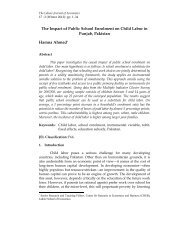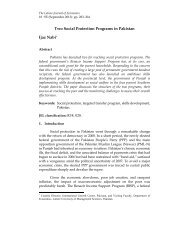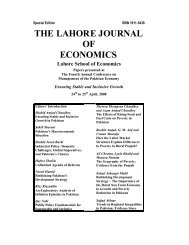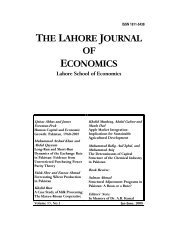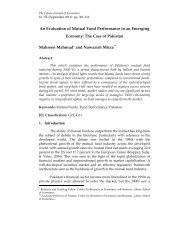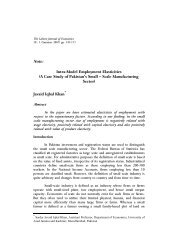Special Edition-07.pdf - Lahore School of Economics
Special Edition-07.pdf - Lahore School of Economics
Special Edition-07.pdf - Lahore School of Economics
You also want an ePaper? Increase the reach of your titles
YUMPU automatically turns print PDFs into web optimized ePapers that Google loves.
76<br />
Shakil Faruqi<br />
taking activities <strong>of</strong> fringe segments such as finance companies, Islamic banks,<br />
micro-finance banks and NBFIs do not hold much potential for bringing<br />
about structural changes at the system level.<br />
One could argue that NSS operations are not financial<br />
intermediation, NSS instruments are not deposit instruments, and deposits<br />
mobilized by the NSS are a part <strong>of</strong> government operations <strong>of</strong> unfunded<br />
debt, not deposit mobilization as such, and these deposits are an expensive<br />
way <strong>of</strong> debt financing. That is largely the case because as the SBP estimates<br />
show, if the government had borrowed Rs. 230 billion through the financial<br />
market instead <strong>of</strong> NSS during FY02, it would have saved about Rs 11 billion<br />
in borrowing costs per year. The NSS, therefore, is neither a low cost<br />
borrowing source, nor a debt management system but has led to distortions<br />
in savings mobilization because <strong>of</strong> its negative impact on banking system<br />
deposits, though institutional depositors are now banned from investing in<br />
NSS instruments.<br />
There has been significant growth <strong>of</strong> financial system credit<br />
throughout the reform period, accompanied by structural changes in the<br />
sources <strong>of</strong> credit along the privatization patterns. During much <strong>of</strong> the<br />
1990s, the rate <strong>of</strong> growth <strong>of</strong> credit remained fairly stable at around 9% per<br />
year, but during CY00-05, this rate increased to about 12% per year with<br />
significant volatility from year to year. This expansion <strong>of</strong> credit at the<br />
financial system level mirrored patterns <strong>of</strong> growth <strong>of</strong> banking credit but in<br />
an accentuated pattern in the late reform period. The average annual<br />
growth <strong>of</strong> banking credit during the decade <strong>of</strong> CY90-00 was about 11%, and<br />
thereafter rose to about 16% during CY00-05. Lately, there are signs <strong>of</strong> a<br />
slowing down <strong>of</strong> credit expansion amidst rising interest rates. Nonetheless<br />
credit expansion is occurring at a record rate <strong>of</strong> growth. The issue is<br />
whether these spectacular increases in banking credit can be sustained, and<br />
if so, does it represent an exception to the trend, or is it the vanguard <strong>of</strong> a<br />
structural change in bank lending that was the expected outcome <strong>of</strong> decade<br />
long financial reforms and dissipation <strong>of</strong> financial repression.<br />
There has been a reversal both in the sources <strong>of</strong> credit and<br />
allocation <strong>of</strong> credit between the public sector and the private sector owing<br />
to privatization, deregulation and the elimination <strong>of</strong> a layered system <strong>of</strong><br />
credit allocation that prevailed earlier. At the start <strong>of</strong> reforms, in CY90 the<br />
proportion <strong>of</strong> credit extended by public sector banks was 86%, while the<br />
share <strong>of</strong> credit extended by private sector banks was only 14%. Later on, the<br />
share <strong>of</strong> private sector banks began to rise and by CY00 it was about 42%,<br />
and then it jumped to about 80% in CY06 in the wake <strong>of</strong> the privatization<br />
<strong>of</strong> UBL and HBL. There was a corresponding decrease in the share <strong>of</strong> credit



